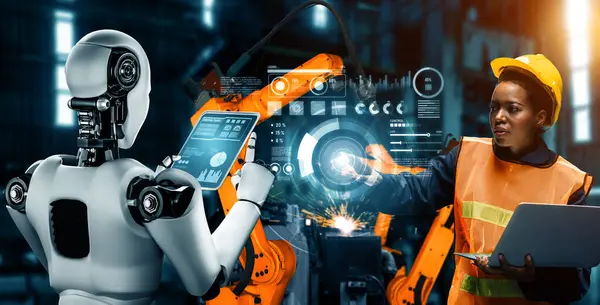Machine Learning and AI are no longer futuristic concepts. They are already transforming how businesses and individuals operate daily. When combined, these technologies unlock boundless possibilities for innovation.
In this blog, we’ll explore these technologies, their use cases, challenges, and how they’re paving the way for innovation.
What is Machine Learning?
Machine Learning and AI enable systems to adapt and improve through experience. Machine Learning is a key component of AI, helping businesses make smarter, data-driven decisions.
Types of Machine Learning Algorithms
-
Supervised Learning:
Trains on labeled data to predict outcomes.
-
Example: Spam email detection.
-
-
Unsupervised Learning:
Identifies patterns in unlabeled data.
-
Example: Customer segmentation in marketing.
-
-
Reinforcement Learning:
Learns by interacting with an environment to achieve a goal.
-
Example: AI playing chess or optimizing warehouse operations.
-
Applications of Machine Learning
-
Healthcare: Predicting patient diagnoses and outcomes.
-
Retail: Personalized recommendations and inventory management.
-
Finance: Fraud detection and credit scoring.
Understanding Artificial Intelligence
Artificial Intelligence (AI) is a broader concept where machines mimic human intelligence, including reasoning, problem-solving, and decision-making. ML is a subset of AI, but other technologies like robotics, computer vision, and natural language processing (NLP) also fall under this umbrella.
Key AI Subfields:
-
Natural Language Processing (NLP):
Powers chatbots, voice assistants, and language translation tools.
-
Example: Google Translate, ChatGPT.
-
-
Computer Vision:
Processes visual information for facial recognition and autonomous vehicles.
-
Example: Tesla’s autopilot system.
-
-
Robotics:
Combines AI and engineering to automate physical tasks.
-
Example: Manufacturing robots on assembly lines.
-
Applications in Industry:
-
Education: Personalized learning experiences using AI-powered platforms.
-
Healthcare: AI-assisted surgeries and real-time diagnostics.
-
Retail: Predicting consumer trends and automating checkout processes.
Generative AI: Creativity Unleashed
Generative AI, powered by Machine Learning and AI, allows for the creation of new content and fuels creativity in various industries.
Key Applications of Generative AI
-
Content Creation:
-
Writing blogs, ad copies, and social media posts.
-
Tools: ChatGPT, Jasper AI.
-
-
Gaming and Entertainment:
-
Generating dynamic game environments and storylines.
-
-
Marketing:
-
Personalized email campaigns and AI-driven design tools.
-
-
Healthcare:
-
Simulating molecular structures for drug discovery.
-
Examples of Generative AI:
-
DALL-E: Turns text prompts into visually stunning images.
-
Deepfake Technology: Creates realistic videos for entertainment and educational purposes.
Generative AI not only automates creative tasks but also expands human capabilities in unimaginable ways.
The Importance of Prompt Engineering
Prompt Engineering is a critical skill for using generative AI effectively. It involves crafting the right prompts (input queries) to guide AI models to produce desired results.
Why Prompt Engineering Matters
Generative AI models don’t inherently understand context—they rely on how you frame your request. Well-structured prompts lead to:
-
Accurate Outputs: Reduces errors and irrelevant responses.
-
Creativity: Unlocks innovative possibilities with AI tools.
-
Efficiency: Saves time in generating content or solving problems.
Examples of Effective Prompt Engineering:
-
General Prompt: “Write a poem.”
-
Result: Generic poem with minimal creativity.
-
-
Optimized Prompt: “Write a rhyming poem about the beauty of artificial intelligence in 100 words.”
-
Result: Detailed, creative, and specific output.
-
Best Practices:
-
Include context and instructions in your prompt.
-
Experiment with variations to refine outputs.
-
Use templates for repetitive tasks.
Challenges and Ethical Considerations in AI
While AI technologies are transformative, they also pose significant challenges and ethical concerns.
Common Challenges:
-
Bias in AI Models:
Algorithms trained on biased data can perpetuate discrimination.
-
Example: Gender or racial bias in hiring tools.
-
-
Lack of Explainability:
Complex ML models often function as “black boxes,” making their decisions difficult to interpret.
-
Energy Consumption:
Training AI models requires massive computational resources, leading to environmental concerns.
Ethical Concerns in Generative AI:
-
Plagiarism and Copyright Issues:
AI-generated content may infringe on intellectual property rights.
-
Misinformation:
Deepfake technology and AI-generated news can spread false information.
-
Job Displacement:
Automation may replace roles in content creation, customer service, and data analysis.
Addressing These Challenges:
-
Use diverse datasets to minimize bias.
-
Develop transparent AI frameworks for decision-making.
-
Advocate for sustainable AI practices to reduce environmental impact.
AI Transforming Industries
AI, ML, and Generative AI are revolutionizing key sectors:
-
Healthcare
-
AI-powered diagnostics and personalized treatment plans.
-
Generative AI simulating molecular compounds for new drugs.
-
Education
-
Adaptive learning systems like Duolingo and Khan Academy.
-
AI tutors providing real-time feedback.
-
Media and Entertainment
-
AI-generated scripts and visual effects in movies.
-
Personalized content recommendations on platforms like Netflix.
-
Business and Marketing
-
Predictive analytics for market trends.
-
AI-driven customer segmentation for personalized marketing.
The Future of AI and ML
The AI landscape continues to evolve rapidly. Here’s what lies ahead:
-
Next-Generation Generative AI Models:
Expect more powerful models capable of producing hyper-realistic content.
-
Automated Prompt Systems:
AI will self-optimize prompts to improve efficiency.
-
Integration Across Daily Life:
From smart home devices to workplace automation, AI will become even more pervasive.
-
Stronger Regulatory Frameworks:
Governments will implement stricter guidelines to address ethical concerns and ensure responsible AI use.
Conclusion
Machine Learning and AI are transforming industries by enhancing decision-making, driving innovation, and solving complex problems.
While challenges persist, adopting these technologies responsibly can unlock unprecedented potential for businesses and individuals alike.




